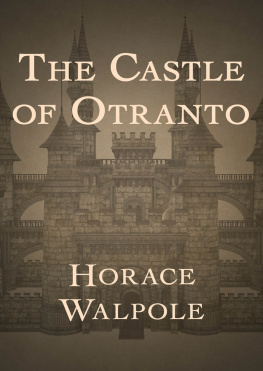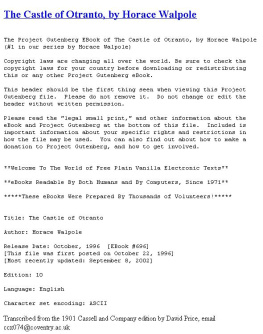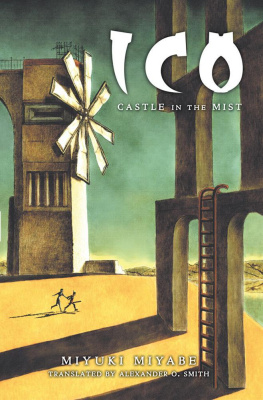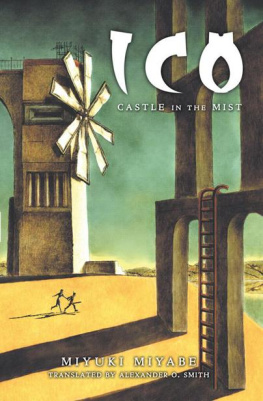The Castle of Otranto
Horace Walpole

SONNET TO THE RIGHT HONOURABLE LADY MARY COKE.
The gentle maid, whose hapless tale
These melancholy pages speak;
Say, gracious lady, shall she fail
To draw the tear adown thy cheek?
No; never was thy pitying breast
Insensible to human woes;
Tender, tho firm, it melts distrest
For weaknesses it never knows.
Oh! guard the marvels I relate
Of fell ambition scourgd by fate,
From reasons peevish blame.
Blest with thy smile, my dauntless sail
I dare expand to Fancys gale,
For sure thy smiles are Fame.
H. W.
CHAPTER I.
Manfred, Prince of Otranto, had one son and one daughter: the latter, a most beautiful virgin, aged eighteen, was called Matilda. Conrad, the son, was three years younger, a homely youth, sickly, and of no promising disposition; yet he was the darling of his father, who never showed any symptoms of affection to Matilda. Manfred had contracted a marriage for his son with the Marquis of Vicenzas daughter, Isabella; and she had already been delivered by her guardians into the hands of Manfred, that he might celebrate the wedding as soon as Conrads infirm state of health would permit.
Manfreds impatience for this ceremonial was remarked by his family and neighbours. The former, indeed, apprehending the severity of their Princes disposition, did not dare to utter their surmises on this precipitation. Hippolita, his wife, an amiable lady, did sometimes venture to represent the danger of marrying their only son so early, considering his great youth, and greater infirmities; but she never received any other answer than reflections on her own sterility, who had given him but one heir. His tenants and subjects were less cautious in their discourses. They attributed this hasty wedding to the Princes dread of seeing accomplished an ancient prophecy, which was said to have pronounced that the castle and lordship of Otranto should pass from the present family, whenever the real owner should be grown too large to inhabit it. It was difficult to make any sense of this prophecy; and still less easy to conceive what it had to do with the marriage in question. Yet these mysteries, or contradictions, did not make the populace adhere the less to their opinion.
Young Conrads birthday was fixed for his espousals. The company was assembled in the chapel of the Castle, and everything ready for beginning the divine office, when Conrad himself was missing. Manfred, impatient of the least delay, and who had not observed his son retire, despatched one of his attendants to summon the young Prince. The servant, who had not stayed long enough to have crossed the court to Conrads apartment, came running back breathless, in a frantic manner, his eyes staring, and foaming at the mouth. He said nothing, but pointed to the court.
The company were struck with terror and amazement. The Princess Hippolita, without knowing what was the matter, but anxious for her son, swooned away. Manfred, less apprehensive than enraged at the procrastination of the nuptials, and at the folly of his domestic, asked imperiously what was the matter? The fellow made no answer, but continued pointing towards the courtyard; and at last, after repeated questions put to him, cried out, Oh! the helmet! the helmet!
In the meantime, some of the company had run into the court, from whence was heard a confused noise of shrieks, horror, and surprise. Manfred, who began to be alarmed at not seeing his son, went himself to get information of what occasioned this strange confusion. Matilda remained endeavouring to assist her mother, and Isabella stayed for the same purpose, and to avoid showing any impatience for the bridegroom, for whom, in truth, she had conceived little affection.
The first thing that struck Manfreds eyes was a group of his servants endeavouring to raise something that appeared to him a mountain of sable plumes. He gazed without believing his sight.
What are ye doing? cried Manfred, wrathfully; where is my son?
A volley of voices replied, Oh! my Lord! the Prince! the Prince! the helmet! the helmet!
Shocked with these lamentable sounds, and dreading he knew not what, he advanced hastily,but what a sight for a fathers eyes!he beheld his child dashed to pieces, and almost buried under an enormous helmet, an hundred times more large than any casque ever made for human being, and shaded with a proportionable quantity of black feathers.
The horror of the spectacle, the ignorance of all around how this misfortune had happened, and above all, the tremendous phenomenon before him, took away the Princes speech. Yet his silence lasted longer than even grief could occasion. He fixed his eyes on what he wished in vain to believe a vision; and seemed less attentive to his loss, than buried in meditation on the stupendous object that had occasioned it. He touched, he examined the fatal casque; nor could even the bleeding mangled remains of the young Prince divert the eyes of Manfred from the portent before him.
All who had known his partial fondness for young Conrad, were as much surprised at their Princes insensibility, as thunderstruck themselves at the miracle of the helmet. They conveyed the disfigured corpse into the hall, without receiving the least direction from Manfred. As little was he attentive to the ladies who remained in the chapel. On the contrary, without mentioning the unhappy princesses, his wife and daughter, the first sounds that dropped from Manfreds lips were, Take care of the Lady Isabella.
The domestics, without observing the singularity of this direction, were guided by their affection to their mistress, to consider it as peculiarly addressed to her situation, and flew to her assistance. They conveyed her to her chamber more dead than alive, and indifferent to all the strange circumstances she heard, except the death of her son.
Matilda, who doted on her mother, smothered her own grief and amazement, and thought of nothing but assisting and comforting her afflicted parent. Isabella, who had been treated by Hippolita like a daughter, and who returned that tenderness with equal duty and affection, was scarce less assiduous about the Princess; at the same time endeavouring to partake and lessen the weight of sorrow which she saw Matilda strove to suppress, for whom she had conceived the warmest sympathy of friendship. Yet her own situation could not help finding its place in her thoughts. She felt no concern for the death of young Conrad, except commiseration; and she was not sorry to be delivered from a marriage which had promised her little felicity, either from her destined bridegroom, or from the severe temper of Manfred, who, though he had distinguished her by great indulgence, had imprinted her mind with terror, from his causeless rigour to such amiable princesses as Hippolita and Matilda.
While the ladies were conveying the wretched mother to her bed, Manfred remained in the court, gazing on the ominous casque, and regardless of the crowd which the strangeness of the event had now assembled around him. The few words he articulated, tended solely to inquiries, whether any man knew from whence it could have come? Nobody could give him the least information. However, as it seemed to be the sole object of his curiosity, it soon became so to the rest of the spectators, whose conjectures were as absurd and improbable, as the catastrophe itself was unprecedented. In the midst of their senseless guesses, a young peasant, whom rumour had drawn thither from a neighbouring village, observed that the miraculous helmet was exactly like that on the figure in black marble of Alfonso the Good, one of their former princes, in the church of St. Nicholas.















